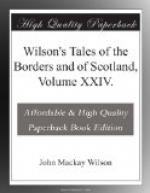XIV.
Two days of sorrow slowly round had crept,
And Helen lonely in her chamber wept,
Shunning her father’s guests, and shunning,
too,
The glance of rage and scorn which now he threw
Upon the child that e’er to him had been
Dear as immortal hope, when o’er the scene
Of human life, death, slow as twilight, lowers.
She was the sunlight of his widowed hours—
The all he loved, the glory of his eye,
His hope by day, the sole remaining tie
That linked him with the world; and rudely now
That link seemed broken; and upon his brow
Wrath lay in gloom; while, from his very feet,
He spurned the being he was wont to meet
With outstretched arms of fondness and of pride,
While all the father’s feelings in a tide
Of transport gushed. But now she wept alone,
Shunning and shunned; and still the bitter tone
In which she heard her Edmund breathe her name,
Rang in her heaving bosom; and the flame
That lit his eye with frenzy and despair,
Upon her naked spirit seemed to glare
With an accusing glance; yet, while her tears
Were flowing silently, as hours and years
Flow down the tide of time, one whom she loved,
And who from childhood’s days had faithful proved,
Approached her weeping, and within her hand
A packet placed, as Edmund’s last command!
Wild throbbed her heart, and tears a moment fled,
While, tremblingly, she broke the seal, and read;
Then wept, and sobbed aloud, and read again,
These farewell words, of passion and of pain.
XV.
EDMUND’S LETTER.
Helen!—farewell!—I write
but could not speak
That parting word of bitterness; the cheek
Grows pale when the tongue utters it; the knell
Which tells “the grave is ready!” and
doth swell
On the dull wind, tolling—“the dead—the
dead!”
Sounds not more desolate. It is a dread
And fearful thing to be of hope bereft,
As if the soul itself had died, and left
The body living—feeling in its breast
The death of deaths, its everlasting guest!
Such is my cheerless bosom; ’tis a tomb
Where Hope lies buried in eternal gloom,
And Love mourns o’er it—yes, my Helen—Love—
Like the sad wailings of a widowed dove
Over its rifled nest. Yet blame me not,
That I, a lowly peasant’s son, forgot
The gulf between our stations. Could I gaze
Upon the glorious sun, and see its rays
Fling light and beauty round me, and remain
Dead to its power, while on the lighted plain
The humblest weed looked up in love, and spread
Its leaves before it! The vast sea doth wed
The simple brook; the bold lark soars on high,
Bounds from its humble nest and woos the sky;
Yea, the frail ivy seeks and loves to cling
Round the proud branches of the forest’s king:
Then blame me not;—thou wilt not, canst




